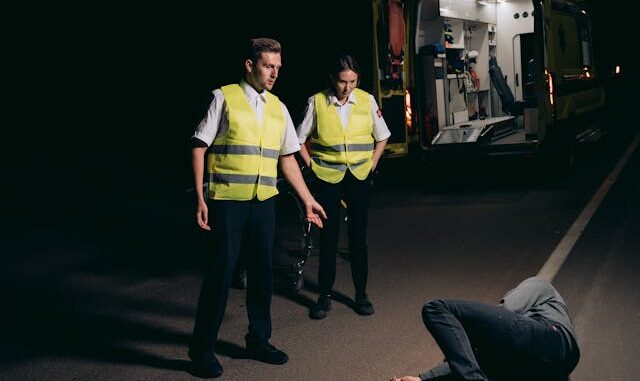
The moments after a car accident in Ontario can be chaotic. Between checking for injuries, securing the scene, and dealing with shaken emotions, deciding whether to involve the police can be a source of confusion. This article clarifies the protocols for interacting with law enforcement after a car accident in Ontario, empowering you to make informed decisions in a stressful situation.
When to Call the Police: Assessing the Situation
It’s not mandatory to call the police for every car accident in Ontario. However, there are specific circumstances where police involvement is crucial:
- Injuries: If anyone involved in the accident is injured, call 911 immediately.
- Serious Property Damage: If the damage to any vehicle involved is extensive and renders them undrivable, police involvement is necessary for an accident report.
- Suspected Criminal Activity: If you suspect drunk driving, hit-and-run, or any other criminal activity related to the accident, contact the police immediately.
- Disagreements on Fault: If there are disagreements about who caused the accident, police presence can help document the scene and collect statements.
- Uncooperative Drivers: If the other driver is uncooperative, refuses to exchange information, or attempts to leave the scene, call the police to document the situation.
Minor Accidents: When a Police Report Might Not Be Necessary
For minor accidents with minimal damage and no injuries, you might be able to exchange information with the other driver and file a collision report online or at a collision reporting centre. Here are some factors to consider:
- Extent of Damage: If the damage to both vehicles is purely cosmetic, a police report might not be essential.
- Cooperation: If both drivers are cooperative and willing to exchange information accurately, a police report might not be necessary.
- Insurance Requirements: Check your insurance policy to see if it requires a police report for any type of collision.
Understanding the Importance of a Police Report
While not always mandatory, a police report serves several critical functions:
- Official Record: The police report becomes the official record of the accident, documenting details like date, time, location, weather conditions, and driver information.
- Facilitates Claims Process: A police report can expedite the claims process with your insurance company by providing an objective assessment of the accident scene.
- Evidence for Disputes: If there are disagreements about fault or details of the accident, the police report acts as an official record for legal purposes.
What to Do When Police Arrive:
If the accident requires police involvement, here’s how to interact with them effectively:
- Stay Calm and Cooperate: Maintain a calm and cooperative demeanor with the officers.
- Provide Accurate Information: Answer questions truthfully and accurately to the best of your ability.
- Do Not Admit Fault: Avoid making statements that could be misconstrued as admitting fault.
- Focus on Facts: Stick to the facts of the accident, describing what happened from your perspective.
- Ask Questions: Don’t hesitate to ask clarifying questions or request additional information from the officers.
What Information Should You Share with the Police?
When interacting with the police, be prepared to share the following information:
- Your Name and Contact Information
- Driver’s License Information
- Vehicle Registration Information
- Insurance Information
- Details of the Accident: Describe the events leading up to the accident, focusing on facts with a neutral tone.
- Any Witnesses: If there were witnesses to the accident, provide their names and contact information if possible.
Taking Pictures and Documenting the Scene
While waiting for police to arrive, if it’s safe to do so, you can take the following steps:
- Document the Scene: Take pictures of the damage to your car, the other vehicles involved, and the accident scene from various angles.
- Gather Information: Exchange contact information with the other driver(s) involved in the accident. This includes names, phone numbers, and insurance details.
- Note Witness Information: If there were witnesses to the accident, note down their names and contact information if possible.
Conclusion
Knowing when and how to interact with the police after a car accident in Ontario can be empowering. By understanding the importance of police reports in specific situations, maintaining a calm and cooperative demeanor with officers, and documenting the scene effectively, you can navigate the aftermath of an accident more smoothly. Remember, your safety and the safety of others involved is the top priority. If in doubt, err on the side of caution and call the police.
